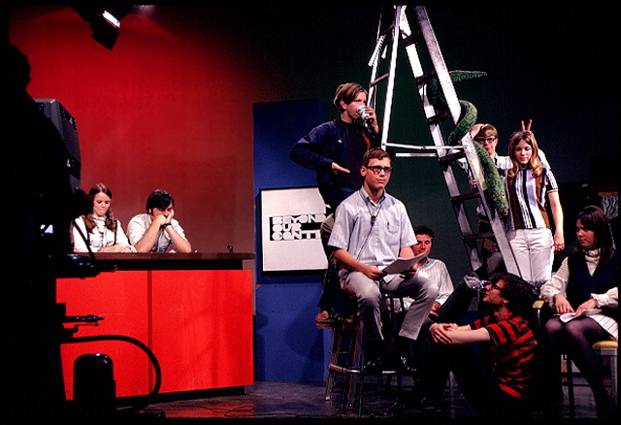Photo caption: Members of the 1968-69 crew of Beyond Our Control in the WNDU-TV studio.
My name is Christine Becker, I’m an associate professor in the Dept. of Film, Television, and Theatre at the University of Notre Dame, and I’ve started this site to chronicle my process of researching and writing a book about the 1968-1986 sketch comedy TV series Beyond Our Control, which was produced in South Bend, Indiana, almost entirely by high school kids. If you don’t know what this show is, the Wikipedia page is a good place to catch up quickly, or you can check out the BOC Alumni Association’s website and its history post, or watch sketches on YouTube here, here, and here. I plan to showcase materials from all of these sources as I go, which will hopefully engage fans of the show and also help me work through ideas along the way. I encourage anyone who has thoughts or memories to share (or – the ultimate dream – intact pre-1978 episodes) to get in touch with me or add comments to a post. I want to know everything, so no comment or query is too small!
For now, I’ve pasted below the opening paragraph for a short (6000-word) essay I’ve already written about the show, which will be published in 2024 by UGA Press in a collection titled Local Television: Histories, Communities, and Aesthetics. The book version will be about a lot more than just the “intricate balance of multiple intertwined forces” that made the series possible, as it says here. The show is nothing less than a portal into the history of local TV, youth culture, comedy, education, and public service, in addition to a fascinating personal story. But hopefully this is at least an engaging tease to start.
“Imagine for a moment you’re 17 again. You’ve grown up with television as your babysitter, your educator, your entertainer. But now much of what television is doing somehow fails to interest you. You’re turning it off — simply because most of the time it’s turning you off. And then someone asks, ‘What would you do if you were given a half-hour of television time to fill each week?’ For 25 teenagers in South Bend, Indiana, that question is being asked. I’m one of those doing the asking — and we’re expecting not only a good theoretical answer, but an actual half-hour program.” — Dave Williams (1971)
Williams, Dave. 1971. “Beyond Our Control — a Junior Achievement Television Program.” Educational Television, April: 11-14.
That actual half-hour program was Beyond Our Control, a sketch comedy series that aired on WNDU-TV, an NBC affiliate in in northwest Indiana, for thirteen weekends in the first quarter of each year from 1968 through 1986. The series was a product of a nonprofit youth initiative called Junior Achievement, which aimed to teach high school students principles of economics and free enterprise. Under this mission and the guidance of creator Dave Williams and a handful of other adult advisers, South Bend-area students between the ages of 14 and 18 undertook nearly every job required to put a commercial TV series on the air, from writing scripts to operating studio cameras and switchers to selling commercial time. Beyond Our Control was billed as “A TV show about TV,” featuring parodies of local and network news, prime-time dramas, sitcoms and variety shows, daytime game shows and soap operas, B movies and art cinema, and nature documentaries and commercials, as well as the occasional epic serial, experiemental film, or animated bit. As such, the series is a remarkable document of American televisual culture across two decades, as well as a gauge of how teenagers in the Midwest assessed the entertainment in which they were steeped. Nineteen years is a very long stretch for any TV series to survive, let alone one made by teenagers with annual labor attrition enforced by high school graduation. A “good theoretical answer” is thus required to explain how the actual half-hour program worked for as long as it did, in the particular city in which it did, and in the format that it did even starting well before its famous national counterparts like Saturday Night Live were conceived. That answer is neither simple nor singular, and it demands understanding of an intricate balance of multiple intertwined forces.
